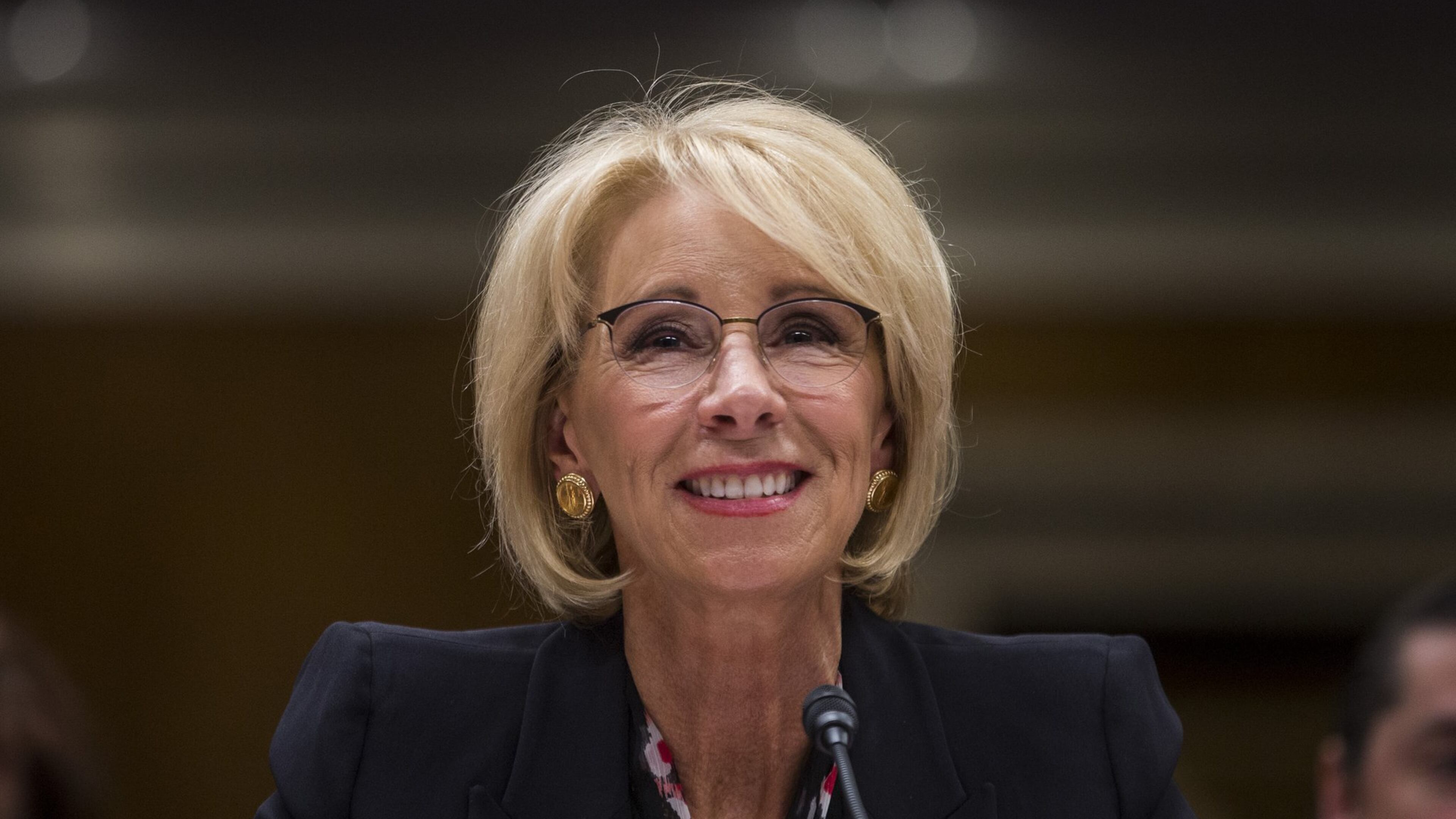Opinion: DeVos can’t be bothered with learning about education

Say this for Secretary of Education Betsy DeVos: She’s consistently elitist.
She’s also consistently obtuse, which often is the demeanor of the entitled. DeVos simply can’t be bothered to consult studies that don’t comport with what she already believes or to consider input from members of Congress who have a duty to safeguard the public education system that serves their constituents.
DeVos is unwaveringly attached, at times to the point of staggering ignorance, to ideological postulates inimical to equality in education.
It’s no surprise that DeVos had the equivalent of a very bad day at school when she appeared Wednesday before a House committee. The five-hour hearing was her first before a House committee since Democrats became the majority, so she couldn’t count on the soft treatment typical of her early tenure.
DeVos prepped herself to answer tough questions the best she could while offering no real information, but in the end she might have had more luck had she just claimed that the dog ate her homework.
A pattern was quickly set. DeVos would deny, dodge, pivot, always delivering the vague replies with a smile.
Members of the House Education and Labor Committee grilled the secretary on many aspects of the administration’s proposed budget, which requests a 12.5 percent cut from previous funding levels.
Democrats tried to draw her out on the administration’s rollback of Obama-era guidance around transgender students, which they argued could undercut those children’s mental health, citing studies about levels of depression, bullying and suicide attempts.
Nope, DeVos wasn’t going to engage. She merely acknowledged that, yes, she knew of such studies.
She held steadfast to the view that the proposed Education Freedom Scholarships are an exciting opportunity for parents and children. It’s a first cousin to voucher programs.
The plan will allow for $5 billion in federal dollar-to-dollar tax credits that can be applied in a variety of ways, including toward private or religious education.
Nor would DeVos actually answer queries about why her department is stalling on deciding if loan forgiveness should be granted to nearly 160,000 people with claims of being defrauded by for-profit colleges.
To be fair to DeVos, it’s not that she doesn’t care about children, education or the future of the nation, despite what her harshest critics believe.
Her problem is that she thinks her views are more important than those of academic experts, of the courts, which have repeatedly ruled against the administration’s efforts, of teachers’ organizations, of parents and of the very children she claims to protect.
Points of view that contradict her own — which boil down to the attitude that the federal government controls too much in education — are quickly dismissed.
One exchange, in particular, illustrated this.
Rep. David Trone, a Maryland Democrat, pressed DeVos to commit to the goals of diversity despite the Trump administration’s rollback Obama-era guidelines on the use of race in admittance policies.
At first, she deferred by claiming that she had no real knowledge of the U.S. Supreme Court case on which the guidance was based.
Eventually, she acknowledged the benefit of diverse educational settings, which is a far cry from actually discussing the complexities of legally accomplishing them.
Trone also tried to pry a useful statement from DeVos by asking if she agreed that racial segregation “poses a threat to the educational opportunities for children of color.”
DeVos replied, “I am concerned with every student.”
Wow. Nobody saw that coming: a deft iteration of “all lives matter” cop-out. That’s the rhetorical ploy favored by people who would rather not discuss the fact that black and brown lives have a peculiar tendency to matter less in American society, in contexts as various as policing, education, employment and wealth. Rather than grapple with why and how structural inequality persists, these people simply chirp that “everyone” is important.
Extremely privileged people — and DeVos’ family wealth is estimated at about $5 billion — can be a bit sheltered from accepting that all they do might not be golden.
During her two years as a cabinet secretary, DeVos has had extraordinary access to resources that could help her see how complicated the world of education is, including the great successes and failures of both traditional public schools and of the charter schools that she champions.
We expect students to engage as life-long learners, to develop adaptive skills that best prepare them for life. And yet at the top of the federal education bureaucracy sits a woman who doesn’t seem to have learned a thing.


